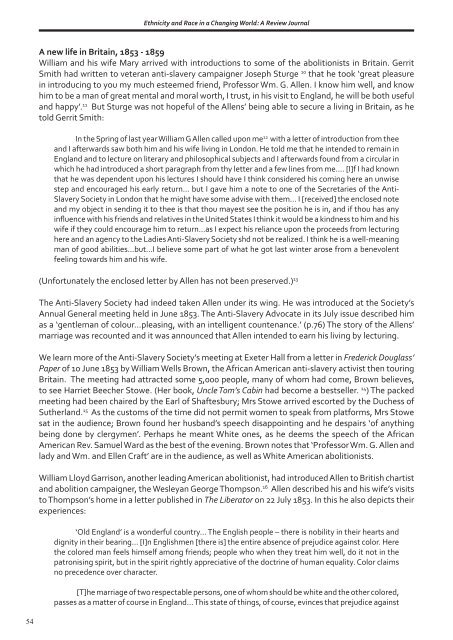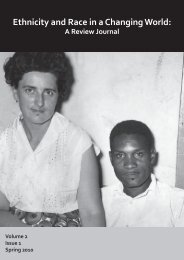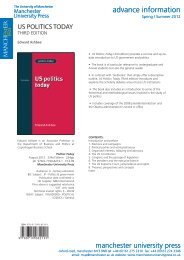Ethnicity and Race in a Changing World
Volume 2, Issue 1, 2011 - Manchester University Press
Volume 2, Issue 1, 2011 - Manchester University Press
Create successful ePaper yourself
Turn your PDF publications into a flip-book with our unique Google optimized e-Paper software.
<strong>Ethnicity</strong> <strong>and</strong> <strong>Race</strong> <strong>in</strong> a Chang<strong>in</strong>g <strong>World</strong>: A Review JournalA new life <strong>in</strong> Brita<strong>in</strong>, 1853 - 1859William <strong>and</strong> his wife Mary arrived with <strong>in</strong>troductions to some of the abolitionists <strong>in</strong> Brita<strong>in</strong>. GerritSmith had written to veteran anti-slavery campaigner Joseph Sturge 10 that he took ‘great pleasure<strong>in</strong> <strong>in</strong>troduc<strong>in</strong>g to you my much esteemed friend, Professor Wm. G. Allen. I know him well, <strong>and</strong> knowhim to be a man of great mental <strong>and</strong> moral worth, I trust, <strong>in</strong> his visit to Engl<strong>and</strong>, he will be both useful<strong>and</strong> happy’. 11 But Sturge was not hopeful of the Allens’ be<strong>in</strong>g able to secure a liv<strong>in</strong>g <strong>in</strong> Brita<strong>in</strong>, as hetold Gerrit Smith:In the Spr<strong>in</strong>g of last year William G Allen called upon me 12 with a letter of <strong>in</strong>troduction from thee<strong>and</strong> I afterwards saw both him <strong>and</strong> his wife liv<strong>in</strong>g <strong>in</strong> London. He told me that he <strong>in</strong>tended to rema<strong>in</strong> <strong>in</strong>Engl<strong>and</strong> <strong>and</strong> to lecture on literary <strong>and</strong> philosophical subjects <strong>and</strong> I afterwards found from a circular <strong>in</strong>which he had <strong>in</strong>troduced a short paragraph from thy letter <strong>and</strong> a few l<strong>in</strong>es from me…. [I]f I had knownthat he was dependent upon his lectures I should have I th<strong>in</strong>k considered his com<strong>in</strong>g here an unwisestep <strong>and</strong> encouraged his early return… but I gave him a note to one of the Secretaries of the Anti-Slavery Society <strong>in</strong> London that he might have some advise with them… I [received] the enclosed note<strong>and</strong> my object <strong>in</strong> send<strong>in</strong>g it to thee is that thou mayest see the position he is <strong>in</strong>, <strong>and</strong> if thou has any<strong>in</strong>fluence with his friends <strong>and</strong> relatives <strong>in</strong> the United States I th<strong>in</strong>k it would be a k<strong>in</strong>dness to him <strong>and</strong> hiswife if they could encourage him to return…as I expect his reliance upon the proceeds from lectur<strong>in</strong>ghere <strong>and</strong> an agency to the Ladies Anti-Slavery Society shd not be realized. I th<strong>in</strong>k he is a well-mean<strong>in</strong>gman of good abilities…but…I believe some part of what he got last w<strong>in</strong>ter arose from a benevolentfeel<strong>in</strong>g towards him <strong>and</strong> his wife.(Unfortunately the enclosed letter by Allen has not been preserved.) 13The Anti-Slavery Society had <strong>in</strong>deed taken Allen under its w<strong>in</strong>g. He was <strong>in</strong>troduced at the Society’sAnnual General meet<strong>in</strong>g held <strong>in</strong> June 1853. The Anti-Slavery Advocate <strong>in</strong> its July issue described himas a ‘gentleman of colour…pleas<strong>in</strong>g, with an <strong>in</strong>telligent countenance.’ (p.76) The story of the Allens’marriage was recounted <strong>and</strong> it was announced that Allen <strong>in</strong>tended to earn his liv<strong>in</strong>g by lectur<strong>in</strong>g.We learn more of the Anti-Slavery Society’s meet<strong>in</strong>g at Exeter Hall from a letter <strong>in</strong> Frederick Douglass’Paper of 10 June 1853 by William Wells Brown, the African American anti-slavery activist then tour<strong>in</strong>gBrita<strong>in</strong>. The meet<strong>in</strong>g had attracted some 5,000 people, many of whom had come, Brown believes,to see Harriet Beecher Stowe. (Her book, Uncle Tom’s Cab<strong>in</strong> had become a bestseller. 14 ) The packedmeet<strong>in</strong>g had been chaired by the Earl of Shaftesbury; Mrs Stowe arrived escorted by the Duchess ofSutherl<strong>and</strong>. 15 As the customs of the time did not permit women to speak from platforms, Mrs Stowesat <strong>in</strong> the audience; Brown found her husb<strong>and</strong>’s speech disappo<strong>in</strong>t<strong>in</strong>g <strong>and</strong> he despairs ‘of anyth<strong>in</strong>gbe<strong>in</strong>g done by clergymen’. Perhaps he meant White ones, as he deems the speech of the AfricanAmerican Rev. Samuel Ward as the best of the even<strong>in</strong>g. Brown notes that ‘Professor Wm. G. Allen <strong>and</strong>lady <strong>and</strong> Wm. <strong>and</strong> Ellen Craft’ are <strong>in</strong> the audience, as well as White American abolitionists.William Lloyd Garrison, another lead<strong>in</strong>g American abolitionist, had <strong>in</strong>troduced Allen to British chartist<strong>and</strong> abolition campaigner, the Wesleyan George Thompson. 16 Allen described his <strong>and</strong> his wife’s visitsto Thompson’s home <strong>in</strong> a letter published <strong>in</strong> The Liberator on 22 July 1853. In this he also depicts theirexperiences:‘Old Engl<strong>and</strong>’ is a wonderful country… The English people – there is nobility <strong>in</strong> their hearts <strong>and</strong>dignity <strong>in</strong> their bear<strong>in</strong>g… [I]n Englishmen [there is] the entire absence of prejudice aga<strong>in</strong>st color. Herethe colored man feels himself among friends; people who when they treat him well, do it not <strong>in</strong> thepatronis<strong>in</strong>g spirit, but <strong>in</strong> the spirit rightly appreciative of the doctr<strong>in</strong>e of human equality. Color claimsno precedence over character.[T]he marriage of two respectable persons, one of whom should be white <strong>and</strong> the other colored,passes as a matter of course <strong>in</strong> Engl<strong>and</strong>… This state of th<strong>in</strong>gs, of course, ev<strong>in</strong>ces that prejudice aga<strong>in</strong>st54






